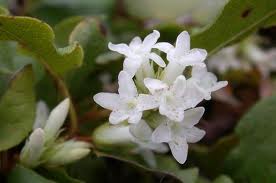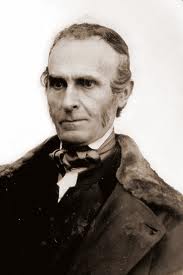Epigaea repens: Spring Sentinel and Nibble
It was an annual family ritual. Every spring when the snow had finally melted we’d go through the low Maine mountains picking the first bloom of the season, Mayflowers, Epigaea repens.
Mind you, we didn’t eat the blossoms though they are edible. They make a pleasant and refreshing trail side nibble. The collecting was more primal. After a long, hard winter we just took the green and fragrant plants home as a reminder of spring. In fact, my mother had her favorite Mayflower haunts and we would visit them all in the course of the short season. She picked them because her mother picked them as did her mother’s mother. Gathering Mayflowers is also where I first heard about “Robin Hood’s Barn.”
My mother said, “you’re certainly going around Robin Hood’s Barn to get there.” My father, driving, said he was. To which I asked about Robin Hood’s Barn. My mother told me to be on the look out for it. Never did see it. It took me years to learn that “going around Robin Hood’s Barn” was taking the long way around.
When I moved to Florida and smelled orange blossoms for the first time in the night air I thought they were Mayflowers. They are also known as Trailing Arbutus. In 1856 James Greenleaf Whittier wrote the poem, “The Mayflowers.” It is below. Whittier had received a gift of Mayflowers on April 30th that year. A note with the flowers said, “You know the Mayflower with us is the flower, and all our people gather them at this season and send them to their friends who have them not. There is such meaning in the Mayflower to all descendants of the Pilgrims and to all lovers of freedom.”
Though Greek it so happens that through one great grandmother, May Eudora Dillingham, I am a Mayflower descendant and also a descendant of Susanna North Martin, who was hanged in Salem, 1692, charged with being a witch. One of May Eudora’s claims to fame — besides being a forager — was as a child she heard Abraham Lincoln speak. She said he had a high voice.
Epi means “upon” and gaea means “earth” Epigaea (ep-uh-GEE-uh) upon the earth. Repens (REE-penz) means crawling or growing along the ground, a low profile. Arbutus (ar-BRU-tus) means struggle. They are protected in some areas, such as Florida and New York.
Green Deane’s “Itemized” Plant Profile
IDENTIFICATION: Shrub to a few inches high, trailing, puts out roots at the joints, evergreen leaves, broadly ovate, 1 to 1 1/2 inches long, rough, leathery, with wavy margins and a point at the end. Flowers at the end of branches in dense clusters, white, with a reddish tinge, very fragrant, five petals form a star.
TIME OF YEAR: Flowers in April and May
ENVIRONMENT: Damp, shaded, mossy rocky woods; prefers moist, acidic soil, and shade. Found in Eastern North America, Central Europe, and Western Africa. Nearly impossible to transplant
METHOD OF PREPARATION: Blossom petals eaten fresh on the trail or in salads.
The Mayflowers
1856
James Greenleaf Whittier
Sad Mayflower! watched by winter stars,
And nursed by winter gales,
With petals of the sleeted spars,
And leaves of frozen sails!
What had she in those dreary hours,
Within her ice-rimmed bay,
In common with the wild-wood flowers,
The first sweet smiles of May?
Yet, “God be praised!” the Pilgrim said,
Who saw the blossoms peer
Above the brown leaves, dry and dead,
“Behold our Mayflower here!”
“God wills it: here our rest shall be,
Our years of wandering o’er;
For us the Mayflower of the sea
Shall spread her sails no more.”
O sacred flowers of faith and hope,
As sweetly now as then
Ye bloom on many a birchen slope,
In many a pine-dark glen.
Behind the sea-wall’s rugged length,
Unchanged, your leaves unfold,
Like love behind the manly strength
Of the brave hearts of old.
So live the fathers in their sons,
Their sturdy faith be ours,
And ours the love that overruns
Its rocky strength with flowers!
The Pilgrim’s wild and wintry day
Its shadow round us draws;
The Mayflower of his stormy bay,
Our Freedom’s struggling cause.
But warmer suns erelong shall bring
To life the frozen sod;
And through dead leaves of hope shall spring
Afresh the flowers of God!




